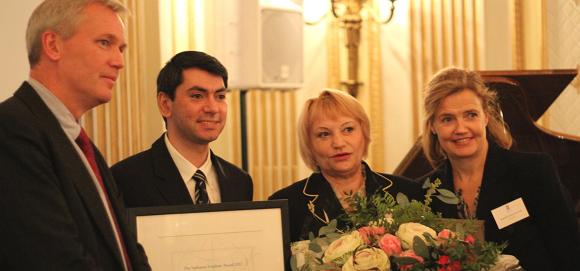The decision comes following an appeal made by Human Rights Commissioner Ella Pamfilova, who asked the court to review the Ministry of Justice’s decision to register Golos. After amendments to the law entered into force this summer, the Ministry of Justice could register organizations as foreign agents by its own decision. Golos was among the first organizations it registered. Pamfilova made the appeal with reference to an April 2014 deciscion by the Constitutional Court, which stated that an organization could not be registered as a foreign agent if it actually did not receive money from foreign funders and consequential appeal.
– Now the Ministry of Justice should de-register Golos, said Engesland. There is no legal justification for keeping Golos in the register. The Ministry could appeal the judgment, but in this case, the facts are very clear. The fines of 400 000 rubles that Golos and Shibanova has paid should be returned.
Golos has been through extensive legal battles to redeem itself from the claim that it functions as a “foreign agent”. The law itself has also been subject to extensive criticism for violating freedom of association and the rights of human rights defender to perform their peaceful activities without being “delegitimized”. – International human rights protects the rights of civil society organizations to co-operate freely on funding and activities across borders, Engesland continues. -However, regardless of the law itself being in breach of human rights, Golos should never have been put on the register. We hope this ruling will result, eventually, in Russian lawmakers realizing that the law in itself is a huge mistake.
The case shows that the Russian human rights organizations are able to win important legal disputes. Still, at least 14 Russian NGOs have been registered by the Ministry of Justice as “foreign agents” and about 20 NGOs have their cases on “foreign agent” reviewed in the court. -Through the litigation exercised by Russian human rights organisations we see the shape of a competent and strong civil society, which Russians can be proud of, concludes Bjørn Engesland
In an 8 September 2014 press release, Lilia Shibanova, stated, “The law on «foreign agents» was initially adopted by the State Duma to discredit Golos. … We were forced to file for liquidation of the Association, so as not to receive new fines and not to join the list of «foreign agents.» One and a half years Golos was fighting with the Ministry of Justice, Prosecutor’s Office and the courts.
We won because of the joint efforts of Nikolai Vasilievich and Victor Mikhailovich from the Office of the Commissioner for Human Rights in Russia, who were providing legal support for the case, Commissioners for Human Rights, Vladimir Lukin, who supported the appeal to the Constitutional Court, and Ella Pamfilova, who submitted a petition to the Moscow City Court regarding a revision of the case by way of supervision, and the constant work during these one and a half years of lawyers Ramil Akhmetgaliev and Ilya Sivoldaev!
And it is, above all, hope for the rest of the non-governmental organizations. We must fight and join the forces of all human rights and non-profit organizations! The Association will restore its status and will seek that the Ministry of Justice excludes any reference to the Association as a «foreign agent.»
The team of Golos did not stop its work for a single day and that is what we are now proud of the most. Despite all the dark technologies, Golos has a strong team, which is able to work in all conditions. We have become more experienced and more motivated to protect the electoral rights in Russia.“
Background
The Association Golos received the Norwegian Helsinki Committee Andrei Sakharov Freedom Award in October 2012, “for its outstanding efforts to promote democratic values through free and fair elections in Russia”. Golos has been conducting large-scale election observations in Russia for over a decade, spreading its activities to more than 40 regions of Russia. The organization mobilized ordinary Russians to take part in elections, underlining the importance of exercising their political rights, and run extensive programs of training volunteers to perform election observations in order to safeguard against fraud.
Golos’ online map of violations of election rules became immensely popular during the 2011 Parliamentary elections and the 2012 Presidential elections.
Golos also advocated reforms of the electoral code in order to improve elections and prevent fraud.
When the so-called law on “foreign agents”, i.a. amendments to the 2006 law on non-commercial organizations, was introduced in 2012, it was widely perceived by commentators to be targeting Golos because of its success in organizing large-scale election observations and exposing fraud.
Both Russian and international human rights experts criticized the law for violating fundamental human rights principles. A group of human rights organizations filed an application concerning the law to the European Court of Human Rights, which is currently reviewing the law.
Applications were also sent to the Russian Constitutional Court to review the constitutionality of the law. Even though the Constitutional Court found the law to be fundamentally compatible with the Constitution, it stated that an organization could not be registered as a foreign agent if it actually did not receive money from foreign funders. This ruling were applied by the Moscow City Court in the case of Golos.
The Norwegian Helsinki Committee has recently published a Policy Paper, explaining why the law is in breach of human rights.
